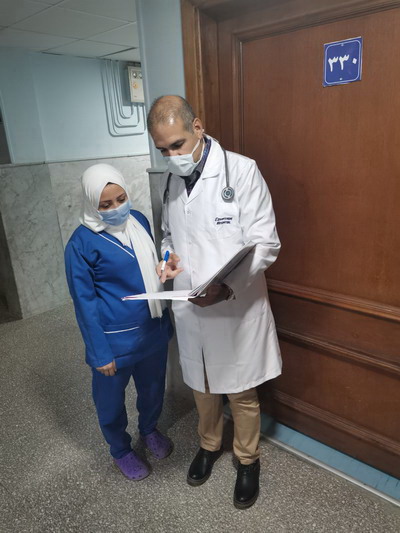 19 May 2020 – When his phone rang in March – a friend calling about his sick mother-in-law – Dr Ahmed Ismail didn’t suspect anything out of the ordinary. A doctor of internal medicine and rheumatology in Cairo, he agreed to make a home visit to check on the woman, who had had a fever on and off for days.
19 May 2020 – When his phone rang in March – a friend calling about his sick mother-in-law – Dr Ahmed Ismail didn’t suspect anything out of the ordinary. A doctor of internal medicine and rheumatology in Cairo, he agreed to make a home visit to check on the woman, who had had a fever on and off for days.
Dr Ismail visited the patient, who is asthmatic and had bronchitis. He didn’t notice anything that alarmed him: “Everything seemed all right,” he says. After prescribing some medication, he told the woman’s family – none of whom were experiencing COVID-19 symptoms – that she should go directly to a testing hospital if she began suffering from a dry cough or shortness of breath.
A few days later, the patient experienced those tell-tale symptoms. She went to the hospital Dr Ismail had specified, where a test confirmed that she had COVID-19. Dr Ismail’s friend called him to tell him the result.
“Unfortunately, I didn’t protect myself,” says Dr Ismail, who hadn’t worn gloves or a mask while visiting the woman. “I didn’t see it coming,” he says ruefully.
Dr Ismail knew that he had to self-isolate and tell everyone that he worked with. He immediately began calling the hospitals where he is a consultant. “I can’t handle the thought that I might infect my patients,” he says. “I can handle the opposite, because that’s my job. But I was worried about my patients.” On the same day that he informed the hospitals, Egypt’s Ministry of Health and Population contacted him with guidance for home isolation precautions.
Five days after visiting the patient, Dr Ismail started to have a mild sore throat with fever. “I am asthmatic, so at this time of year, I typically cough. Usually I wouldn’t pay attention, but I knew I had had contact with an infected patient,” he says. So he quickly went to the fever hospital to get tested, and a day later received a positive result.
Dr Ismail went to the isolation hospital designated for COVID-19 patients in Cairo, staying there for several days. As a doctor, he wanted to protect staff, and told them he would record his own vitals.
At first, being totally alone in a hospital room was manageable. His symptoms were mild. “I had 2 books and the internet. I also passed the time praying and on video calls with my wife and kids,” he says. “I was thinking about the Middle East crisis and I found solutions,” he jokes.
But as the days turned into a week, it got harder. “Quarantined in a single room, with no one coming to me, I was talking to no one and going 'insane',” he says. “The last couple of days were like hell to me.
“I think it was a mistake to play hero and ask them not to check on me,” Dr Ismail says now. “This is another lesson I’ve learned: They should treat me like a patient, and I should behave like a patient.”
Finally, he tested negative twice for COVID-19 and could leave the hospital. After more precautionary self-quarantine in his own home, he knew he had something precious to offer future COVID-19 sufferers: his blood. Research into plasma-based treatment for COVID-19 is still in its infancy, with no treatment confirmed effective yet by WHO. But Dr Ismail wanted to contribute to the growing number of scientific studies about what might work to help people with the virus. So he donated his plasma. “It took 45 minutes and it doesn’t hurt at all,” he says. “It’s an easy procedure. I did it while drinking my coffee.”
Now fully recovered, he wants to share the lessons he’s learned with healthcare workers facing the disease. Based on his own stressful quarantine experience, he counsels: “Whenever you are a patient, forget you are a doctor, behave like a patient.”
And never forget personal protective gear like masks and gloves: “Make sure to be protected while dealing with patients, be cautious with every single patient you are seeing,” he says. “Don’t think it’s far away. You can always be infected.”



